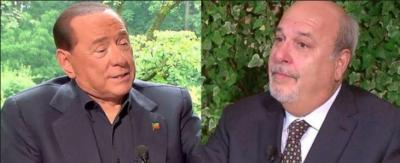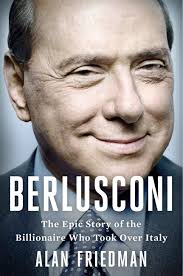Books: Sanitised chronicle of a skilled simplifier's rise and fall

ROME - A Signor Five-by-Five with a rolling gait, Silvio Berlusconi believes he is God’s gift not only to women but to Italy and the world. His boundless self-confidence took him a long way from cruise ship crooner, while studying law, to three times Prime Minister but an unfunny thing happened to him on the way to the Forum – nasty magistrates got on his trail and eventually brought down the high-flyer. He gained world-wide notoriety for so-called bunga bunga sex orgies in his villa, which he claimed were merely elegant dinner parties and have not led to any definitive conviction, but another trial is due.
Alan Friedman, an American financial journalist who lives in Tuscany, has written ‘Berlusconi’ based on 100 hours of interviews. He cites as his inspiration David Frost’s television interviews with Richard Nixon but, unlike Frost, he does not force his interviewee to reveal even his defects.
Many have asked how Italians could have voted for such a figure as Berlusconi but it was not difficult to understand the initial enthusiasm. After world war II the Christian Democratic Party had ruled with various partners and fostered the postwar boom but, anxious to keep the Communists out of power, it had not been rejuvenated by a spell in Opposition. As a centrist Party moving left, it eventually formed a coalition with the ‘cashmere’ Socialists which, by the early 1990s, wallowed in corruption. Anti-corruption investigators triggered Bribesville trials which swept aside all the major parties except the Communists who looked certain to win the 1994 elections.
But Berlusconi sprang a surprise. In his mid-twenties he had begun as a builder in his home town Milan and installed closed circuit television in the huge estates he created. This gave him the idea of a television station which could only be local because of the State monopoly of national broadcasting. Berlusconi challenged the monopoly and won. State television had been mainly sober and discreetly educational but the motto of Berlusconi’s three channels seemed to be Let it All Hang Out: it had housewives’ strip tease shows, lavish spectacles, many recycled American shows. It brought hedonistic consumerism into Italian homes and it cost nothing whereas there was a licence fee for State television.
Friedman traces well the irresistible rise of Silvio. Initially television ownership was like having a mint: the profits enabled Berlusconi to buy his boyhood soccer team Milan and transform it into winner of the Italian championship and the Champions’ League. An owner whose only tactic was ATTACK impressed a soccer-drugged nation.
He was the freshest face of Italian capitalism. Establishment enterpreneurs such as Giovanni Agnelli, owner of Fiat car company, were satisfied to pull political strings, enabling them to nationalise losses and pocket profits. They advised Berlusconi to avoid direct political involvement but he did not want the Communists, who had been dumped in Eastern Europe, taking over Italy. In six weeks he organized a party based on his business offices, formed a coalition with the separatist Northern League and the formerly beyond –the-Pale neo-Fascists, and beat the Communists. Electors welcomed him as a non-politician who promised a liberal Italy. Basically a showman, he is a formidable, smiling, omnipresent campaigner who knows how to sell a dream.
Berlusconi’s international consecration was expected when he hosted a United Nations conference on transnational crime in Naples in November 1994 but, as it opened, the main daily, the Corriere della Sera, ran a front- page story that Milanese magistrates were investigating him for bribery. It had been leaked which convinced Berlusconi and his followers that certain magistrates would do anything to wreck him. As a result of the leak, he was ousted within a few months. That set a pattern unchanged in the past 20 years: popular support which led to two more and longer terms as Prime Minister but judicial enquiries which, under Italy’s three -tier system, sometimes ran for ten years, producing only one definitive penal sentence, in 2013, for fiscal fraud. He claims this ‘persecution by leftist magistrates’ has cost him 600 million euro.
Friedman summarises the charges against Berlusconi and reports his responses which simply trash them all. There are not enough follow-up questions, certain arguments are not pursued, such as the plausible suspicion that Berlusconi introduced laws designed to protect him, there is scant attention to the conflict of interest due to Berlusconi controlling much of book publishing and some of the press as well as television, and no mention of the speculation about how Berlusconi obtained the principal of his 20 Italian residences, at Arcore near MIlan. He got the 18th. century villa in 1974 for a sixth of its value. Was it luck or was there a deal between the owner’s agent, Cesare Previti, and Berlusconi? Later Previti became a Minister of Berlusconi’s government before being sentenced for bribing judges.
Friedman provides some new insights on Berlusconi’s foreign dealings. He was a friend of George Bush but, surprisingly for a man who has made a career of anti-Communism, an even greater friend of the ex-KGB operative Vladimir Putin. They still form a fervent mutual admiration society. He also blandished Muammar Ghedaffi and disagreed with Sarkozy’s attack on Libya without any plans for Ghedaffi’s replacement. There is a detailed account of Berlusconi resisting an attempt by Sarkozy, Merkel and Christine Lagarde of the IMF, at the G20 meeting in Cannes in 2011, to reduce Italy to the status of Greece. Friedman claims that at the same time the Italian President George Napolitano, who finally convinced him to step down, was plotting to remove Berlusconi. (Napolitano did maneuver to remove Berlusconi because not only was his bunga bunga reputation an embarrassment but the economy was nose- diving.)
Friedman provides a rare pro-Berlusconi viewpoint. He calls Berlusconi’s life ‘epic and romantic’ but, unless, on the verge of 80, he makes another of his amazing bounce-backs, he will be the man who won the lottery but lost the ticket: his coalition won big majorities but he mistakenly thought he could run parliament like his businesses. He did not deliver on his promises to reduce unemployment and taxes. Although he has personal qualities, such as generosity and humour, he was arrogant in his coalition and Party, not allowing internal democracy which fractured them. ( One of the oddest quotes from the interviews is ‘the current pope acts exactly as I would have done if I were pope’)
He still hopes to return as Prime Minister but he blew his opportunity to create a credible conservative party. Paradoxically part of his legacy is the center-left Prime MInister Matteo Renzi, an enthusiast and a skilled simplifier like Berlusconi but more of a politician, who has robbed his better policies in an attempt to occupy the centre ground.
Berlusconi
Alan Friedman
Hachette p. 390



